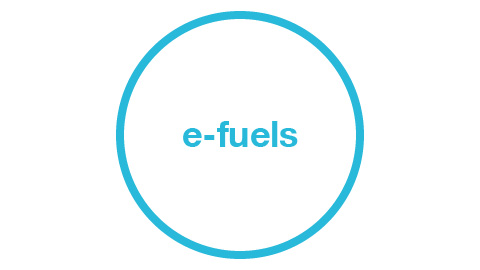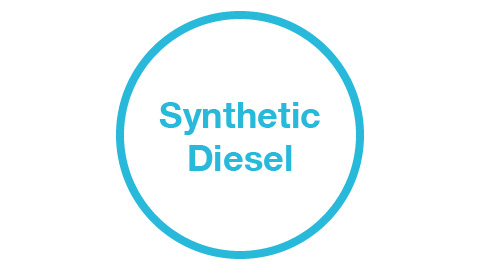Fuel for thought. Check the alternatives
Alternative fuels are important because they allow us to decarbonize sectors that are hard to electrify, such as shipping. This is especially true of so-called e-fuels, which are derived from renewable energy sources. MAN Energy Solutions not only provides engines that run on alternative fuels but is active in the production of e-fuels. Our Power-to-X processes convert renewable energy sources into hydrogen, SNG, methanol, and ammonia.
Carbon-free fuels
Carbon-free fuels do not emit CO2 when they burn or when they are produced. They are based on green hydrogen, which is made using renewable energy and water.

e-fuels
Derived from renewable energy
Also know as green fuels, e-fuels are produced from green hydrogen and renewable electricity, they allow the decarbonization of sectors where direct electrification is not feasible.

e-methanol
Liquid fuel - Biodegrable and economical
Methanol is a clean-burning and cost-effective fuel, since it can be used with existing infrastructure. Green methanol can reduce carbon emissions by up to 95%.

Ammonia
Gas fuel - Paving The way to net zero
Ammonia from renewable energy sources releases almost zero CO2 and SOx emissions.

Hydrogen
Gas fuel - Element of decarbonization
Green hydrogen is carbon free. Medium-speed engines can currently be operated with up to 25% hydrogen admixture.
Carbon-neutral fuels
Carbon-neutral fuels do not increase carbon dioxide (CO2) in the atmosphere when they are burnt because they are based on CO2 taken from the atmosphere as a feedstock. For example, biofuel is made from plants that take CO2 from the air by photosynthesis.

Synthetic Diesel
Liquid fuel
Synthetic diesel is made by reconfiguring another hydrocarbon fuel, such as natural gas, into liquid diesel fuel.

Biofuel
Liquid fuel - The drop-in solution
Nearly 100% carbon neutral and fully renewable, liquid biofuels are easy to transport, store and handle.

Synthetic Natural Gas Biogas
Gas fuel - Bridging fuels
SNG and biogas can be carbon-neutral and can be blended with LNG to reduce carbon emissions until other alternative fuels become more available.
Discover SNG/ Biogas in shipping Discover SNG/ Biogas in power generationAlternative fossil fuels
These fuels emit CO2 in their production and consumption, but a lower rates than conventional liquid fossil fuels. They can lower CO2 emissions and sometimes eliminate other pollutants such a sulphur.

Very Low-Sulphur Fuel Oil
Liquid fuel - Compliant with IMO
Since 2020, the maximum sulphur content of marine fuels is 0,5% according to the IMO MARPOL Annex VI. To use high-sulphur fuel oil, a ship needs scrubbers.
Discover more about Low Sulphur Fuels
Liquefied Natural Gas
Gas fuel - The first step towards clean fuels
Natural gas is considered to be a viable transitional fuel on the path towards zero-carbon and is suitable for power generation as well as two-stroke and four-stroke marine engines.
Discover LNG in shipping
Liquid Petroleum Gas
Gas fuel - Clean burning
LPG can contain close to zero sulphur and meets the requirements for Sulphur Emission Control Areas as well as lowering CO2 emissions. LPG has a high energy density and is easier to store than LNG or heavy fuels (HFO).

Liquefied Ethane Gas
Gas fuel - Fossil fuel without sulphur
Ethane (C2H6) is a colorless, odorless gaseous alkaline found in natural gas and used as fuel
Talk to our experts
Explore more topics
MAN Energy Solutions is now Everllence.
We have adopted a new brand name and moved to a new domain: www.everllence.com. This page will also be relocated there shortly. We are working on shifting all pages to www.everllence.com.
